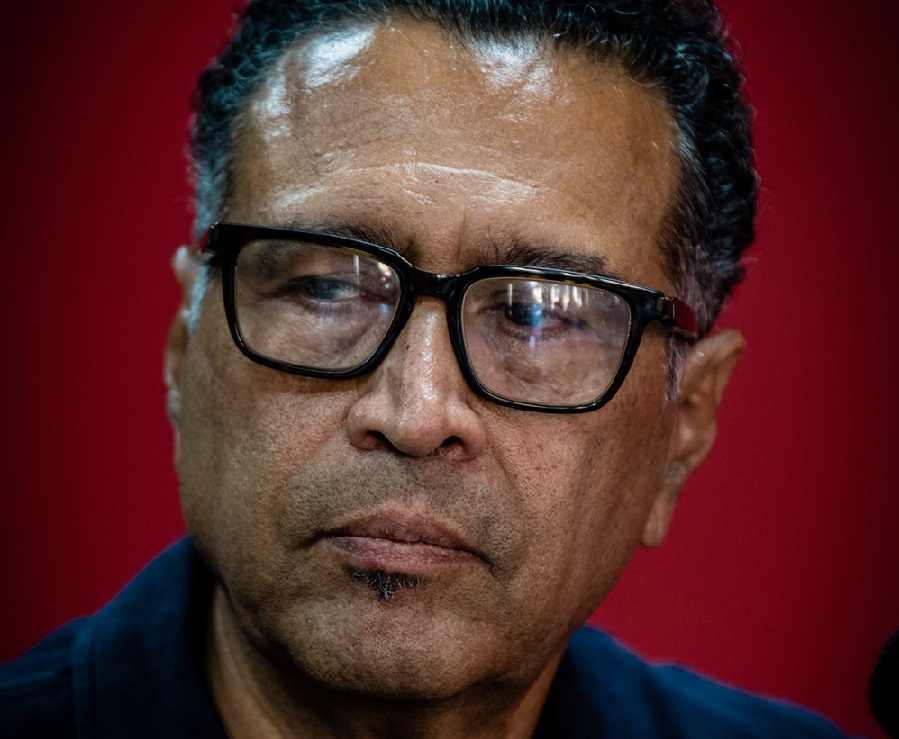- Humanities
- 27 de June de 2024
- No Comment
- 9 minutes read
Carlos Roberto Gómez: The University of Puerto Rico, spanning eleven campuses, continues to face significant challenges

Interview with Carlos Roberto Gómez: poet, professor, editor, and cultural promoter
Carlos Roberto Gómez: “The University of Puerto Rico, spanning eleven campuses, continues to face significant challenges”


In Puerto Rico, Carlos Roberto Gómez is a well-known figure because he is hyperactive. Instead of ageing, it seems he man rejuvenates and wants to stir up more trouble. He is a professor at the University of Puerto Rico in Humacao and a prolific poet, having earned six national awards for his work (recent titles include: La espina que florece 2023; Inventario 2022; Un largo suspiro 2021). Beyond his academic duties, , he dedicates himself to nurturing his editorial project (Isla Negra www.islanegra.com), mentoring young writers, ensuring the continuity of academic journals (Cuadrivium, Exégesis), and promoting cultural management as a form of nomadic outreach.
Dear Carlos Roberto, congratulations on 32 years of Isla Negra… How do you reflect on this milestone? How do you perceive your own journey? Do you envision reaching the half-century mark?
First, I want to express my gratitude for this generous and genuine invitation. As I prepare to retire from the University next year, this new stage prompts me to think and rethink Isla Negra Editores… I believe we have established a model, particularly within and emanating from the Caribbean. The publication of more than eight hundred titles—though I’ve never sought the exact count because 800 can feel like a lot and yet also seem like so few—has profoundly impacted me. Depending on the day, I find myself contemplating whether to continue steering the ship forward or to pass the baton.
Can you recommend some young Puerto Rican authors to us?
As an editor, I will take the privilege of not singling out individuals, but I can confidently say that this is a remarkable time for Puerto Rican poetry. The output from independent and alternative publishers has provided crucial support to emerging writers. At Isla Negra, we have launched a new series within our essay collection Visiones y cegueras titled Hermanas López Baralt, paying homage to the research and exemplary work of the renowned academics Luce and Mercedes López Baralt. This series showcases the master’s theses of the youngest researchers.
How is Puerto Rican historiographic production? Is there a new generation?
It is very vibrant and productive. Coincidentally, not long ago we published a book titled: Interioridades: Entrevistas a doce historiadores puertorriqueños, which gathers much of that new generation (of historians) you refer to. The authors Luis A. López Rojas and José R. Calderón Rivera are two prominent members of that new historiographic school.
“Isla Negra has persevered in its mission even during hurricanes, pandemics, and fiscal control boards”
What are you currently publishing? What’s happening in Puerto Rico?
Isla Negra has persevered in its mission even during hurricanes, pandemics, and fiscal control boards. Right now, we are immersed in the summer cycle, which includes books on literary criticism, sports historiography, short stories, novels, poetry, and more.
How is the country faring overall? When we last spoke, much of it lay in ruins amidst a civic revolution… Have those challenges been overcome?
The country, impacted by Hurricane Maria, earthquakes in the southern region, and measures imposed by a fiscal control board appointed by the US federal government, still stands resilient. However, recovery has been very slow, primarily due to bureaucratic hurdles exacerbated by corruption among administrators and politicians. This has impeded progress as expected.
Have the dark clouds hanging over the UPR disappeared? Do you still refer to your institution as “Yupi”?
The University of Puerto Rico, spanning eleven campuses, continues to face significant challenges. As the state’s foremost institution of higher education—known for its economic accessibility and prestige—it remains vulnerable to political fluctuations and severe budget cuts imposed by the Control Board, which has inflicted the deepest financial slashes across government agencies. Moreover, demographic decline, stemming from the exodus of Puerto Ricans to the US following hurricanes, earthquakes, and the Board’s measures, further compounds its struggles. Consequently, discussions about campus closures, the scarcity of permanent faculty positions, and tuition hikes are prevalent today. Affectionately known as “Yupi,” derived from the initials UPR, the university perseveres amidst these adversities.
You were born in the Dominican Republic in 1959… I know you maintain strong cultural ties with the neighbouring island… Tell us about that.
I was indeed born in the Dominican Republic to a Dominican mother and a Guatemalan father. Since the age of five, however, I have called Puerto Rico my home. I often summarize my cultural journey in my literary biography: “Born in the Dominican Republic and reborn in Puerto Rico.” My Dominican roots are deeply intertwined with the years I spent from ages six to sixteen, during summer holidays at my maternal grandparents’ home in a town called El Seibo. Later on, through the Isla Negra project, I solidified these emotional connections to foster a cultural bridge between the two islands. This initiative has led us, among other achievements, to become the sole Caribbean publisher consistently present at all 24 editions of the Dominican Republic International Book Fair. We’ve also been instrumental in publishing and promoting significant Dominican writers.
“There is an identity based on the dreams, struggles, and projects of Martí, Luperón, and Betances, among other essential Caribbean patriots”
Is there an Antillean identity?
Yes, there is an identity based on the dreams, struggles, and projects of Martí, Luperón, and Betances, among other essential Caribbean patriots. Isla Negra Editores is a humble attempt to bridge the gap between these islands, which, despite their proximity, remain distant from one another. Our anthology projects Los nuevos caníbales are perhaps the best example of our effort to ensure that this dream is not just a dream.
Are Mayagüez and Aguadilla still beautiful?
Those two cities in the west of the island, which were so paradigmatic for you and your research during your two trips to Puerto Rico, remain vibrant, thriving, and culturally significant.
Are you still such a Neruda enthusiast?
Although Isla Negra pays tribute to one of Pablo Neruda’s three houses in Chile, my initial devotion to this great poet -motivated by Residencia en la tierra, the first poetry book I read on my journey into this mystery- has turned into a devotion to poetry as an art form. Thus, beyond Neruda, I have been deeply moved by voices across the Americas like Huidobro, Paz, Vallejo, and Mir de Burgos, as well as voices from Japan with haiku, France with the symbolists and Spain with the Generation of ’98 and ’27. More recently, I have found inspiration in other masters such as José Valente from Spain and Blanca Varela from Peru.
“A flamboyant tree is constantly ablaze with flowers that reflect the red of blood and the yellow of the sun”
What are your current projects?
In terms of poetry, I am currently working on three books: Diario de un camino (brief poetic prose on poetry), Exilio (poetry), and Cinema Paradiso y otros boletos de ida (poetry). Academically, I have accepted an invitation to join the Executive Committee of the UNESCO Chair in Higher Education at the Río Piedras campus of the UPR. This new project will lead me to step away from my teaching responsibilities at the Humacao campus while continuing to oversee the journals Exégesis and Cuadrivium.
Lastly, could you explain what a flamboyant tree is?
A flamboyant tree is constantly ablaze with flowers that reflect the red of blood and the yellow of the sun. Its roots anchor it firmly to the earth, like an incredible ship. Its shade spans as wide as the wings of mythical eagles. Witnessing it for the first time is akin to forever carrying a piece of the Caribbean with you.
Source: educational EVIDENCE
Rights: Creative Commons

